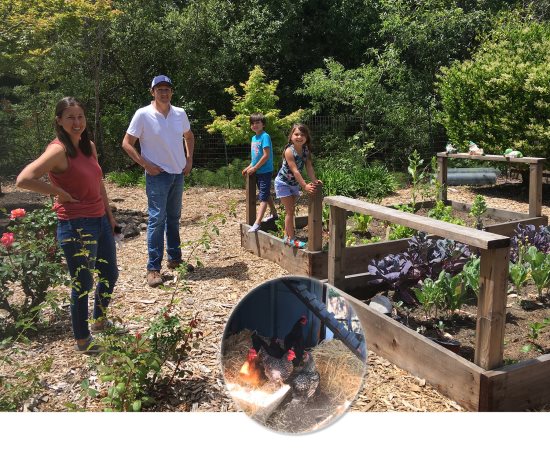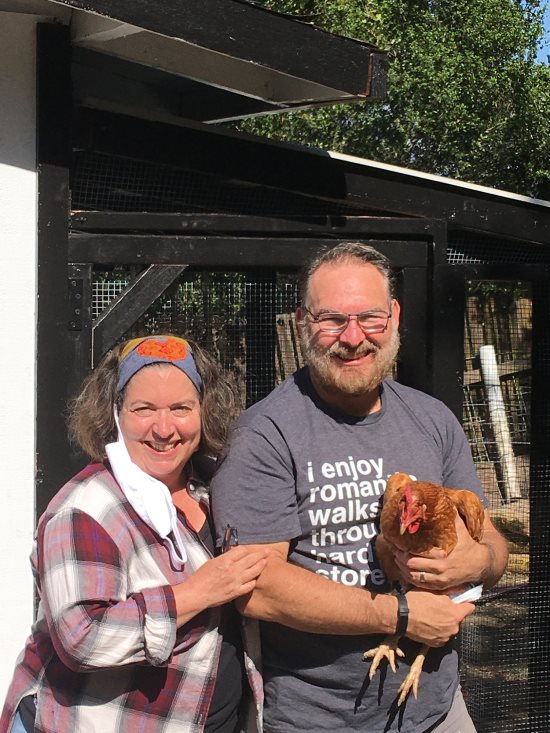| | Published May 27th, 2020
| Crisis brings revival of the homestead
| | | By Sophie Braccini |  | | Kelly and Ben Rojas and their children enjoy their new raised beds full of vegetables. Linda Bowers raises 24 little chicks at her home for friends who want to start a new coop. Photos Sophie Braccini |
It has become quite a hunting game to find some of the most coveted tomato plants or beneficial herbs at local nurseries. Growing vegetables or raising chickens in Lamorinda has definitely been on the uptick for the past two months, with chicks just as hard to find as heirloom tomatoes or borage. The desire to run less errands for food supplies may be the motivation, but with more time at home and children to keep busy, growing the homestead has become a fruitful endeavor for many Lamorindans.
 Kelly and Ben Rojas moved their young family from San Francisco to Moraga last year. Growing a vegetable garden became one of Ben Rojas' priorities from the get-go, but only this year has the family devoted the time researching and planning for the new raised beds he built.
Kelly and Ben Rojas moved their young family from San Francisco to Moraga last year. Growing a vegetable garden became one of Ben Rojas' priorities from the get-go, but only this year has the family devoted the time researching and planning for the new raised beds he built.
 Not very far, in Lafayette, Papa John Kiefer (a.k.a. Lamorinda-chicken-guru) was stunned at the sudden unprecedented rush to his website where people can purchase plans to build the perfect coop and register for his chicken class series. He heard that the craze was such that in April, the usual month to get baby chicks, all the local suppliers were out of female poulets for sale and ordering from the Midwest would send buyers waiting until June.
Not very far, in Lafayette, Papa John Kiefer (a.k.a. Lamorinda-chicken-guru) was stunned at the sudden unprecedented rush to his website where people can purchase plans to build the perfect coop and register for his chicken class series. He heard that the craze was such that in April, the usual month to get baby chicks, all the local suppliers were out of female poulets for sale and ordering from the Midwest would send buyers waiting until June.
 Linda Bowers did not have the issue of finding new chicks. A founding member of the Citizens of Lamorinda United Chicken Keepers (CLUCK), Bowers was part of the group that 10 years ago lobbied Lafayette to allow chickens in most suburban gardens. As the coronavirus spread and shelter-in-place became mandatory more and more people reached out to CLUCK for information. "A month ago we started a CLUCK Facebook page and within a few days we got 100 members," she recalls.
Linda Bowers did not have the issue of finding new chicks. A founding member of the Citizens of Lamorinda United Chicken Keepers (CLUCK), Bowers was part of the group that 10 years ago lobbied Lafayette to allow chickens in most suburban gardens. As the coronavirus spread and shelter-in-place became mandatory more and more people reached out to CLUCK for information. "A month ago we started a CLUCK Facebook page and within a few days we got 100 members," she recalls.
 A group of 30 people on May 3 crowded cyberspace to hear Papa John's teaching. When asked, these new future chicken owners confirmed that the health crisis had revived their desire to have chickens. Yvette Castillo felt that this was a perfect time to raise chicks. Monica Kase got her new chicks from Dare 2 Dream Farms in Lompoc. "We heard that they would have some chicks available, so people stood in line from early morning and the chicks were gone within minutes," she said. Jennifer Soller and Bethany Block, who bought homes that had coops that were left unused for years, decided that it was time to revive them, but as Bowers noted, the prices for baby chicks have multiplied as scarcity set into place.
A group of 30 people on May 3 crowded cyberspace to hear Papa John's teaching. When asked, these new future chicken owners confirmed that the health crisis had revived their desire to have chickens. Yvette Castillo felt that this was a perfect time to raise chicks. Monica Kase got her new chicks from Dare 2 Dream Farms in Lompoc. "We heard that they would have some chicks available, so people stood in line from early morning and the chicks were gone within minutes," she said. Jennifer Soller and Bethany Block, who bought homes that had coops that were left unused for years, decided that it was time to revive them, but as Bowers noted, the prices for baby chicks have multiplied as scarcity set into place.
 Nurseries, since they reopened, report having been flooded with new as well as seasoned vegetable gardeners. Some of the local gardening communities that used to sell tomatoes or other early spring seedlings canceled their annual sale. Moraga Community Garden or the UC Master Gardener Program of Contra Costa County both decided that opening to the public was not safe so they redirected their production to local nurseries better equipped to manage social distancing, such as the Moraga Garden Center or Orchard Nursery in Lafayette. Both places reported large numbers of customers, though sometimes it was hard to distinguish between catch-up from the close-down period and a new craze. McDonnell nursery in Orinda had stayed open most of March and April and Sarah McDonnell confirmed an increase in vegetable gardening requests.
Nurseries, since they reopened, report having been flooded with new as well as seasoned vegetable gardeners. Some of the local gardening communities that used to sell tomatoes or other early spring seedlings canceled their annual sale. Moraga Community Garden or the UC Master Gardener Program of Contra Costa County both decided that opening to the public was not safe so they redirected their production to local nurseries better equipped to manage social distancing, such as the Moraga Garden Center or Orchard Nursery in Lafayette. Both places reported large numbers of customers, though sometimes it was hard to distinguish between catch-up from the close-down period and a new craze. McDonnell nursery in Orinda had stayed open most of March and April and Sarah McDonnell confirmed an increase in vegetable gardening requests.
 From conversations with new vegetable gardeners like the Rojas, Rachel Chaudhary or Angela Munoz, it appears what motivated them most this year was the additional time they had and the enjoyment they derived from working in their new beds as a family. Munoz had also moved from San Francisco and found herself in a house with empty vegetable beds; mixing the dirt with her kids and watering with them has been a part of her new simple life pleasures this spring; just like the Rojas children enjoy observing small plants becoming edible vegetables they recognize, nibbling on mint and strawberries, while their mother added weeding to her offsprings' chores list.
From conversations with new vegetable gardeners like the Rojas, Rachel Chaudhary or Angela Munoz, it appears what motivated them most this year was the additional time they had and the enjoyment they derived from working in their new beds as a family. Munoz had also moved from San Francisco and found herself in a house with empty vegetable beds; mixing the dirt with her kids and watering with them has been a part of her new simple life pleasures this spring; just like the Rojas children enjoy observing small plants becoming edible vegetables they recognize, nibbling on mint and strawberries, while their mother added weeding to her offsprings' chores list.
 All the new gardeners, like the new chickens owners, relied on their community, and the universal "YouTube University" to learn about life cycles, feeding, companion planting, seasonality, and progressed through trial and error. Chaudhary, for example, reached out to one of her neighbors when she discovered at 6 a.m. one morning that slugs were having a field day with her baby eggplants.
All the new gardeners, like the new chickens owners, relied on their community, and the universal "YouTube University" to learn about life cycles, feeding, companion planting, seasonality, and progressed through trial and error. Chaudhary, for example, reached out to one of her neighbors when she discovered at 6 a.m. one morning that slugs were having a field day with her baby eggplants.
 All who were interviewed swore that the new hobby is now ingrained in their family life and will not go away with the easing of shelter-in-place constraints. After World War II the craze of Victory Gardens died down and millions of gardens were abandoned. Only time will tell if this health crisis will have a longer and deeper effect on the way people relate to their land and their food supply.
All who were interviewed swore that the new hobby is now ingrained in their family life and will not go away with the easing of shelter-in-place constraints. After World War II the craze of Victory Gardens died down and millions of gardens were abandoned. Only time will tell if this health crisis will have a longer and deeper effect on the way people relate to their land and their food supply.
 As some new gardeners have expressed it, gardening is simply a nice thing to (re)discover right now, and cultivating something beautiful and useful could have mental health benefits in times of great stress.
As some new gardeners have expressed it, gardening is simply a nice thing to (re)discover right now, and cultivating something beautiful and useful could have mental health benefits in times of great stress. |
 | | Linda Bowers and her husband in front of their coop with one of their hens. Photo Sophie Braccini | | | | | | | | | | | |





